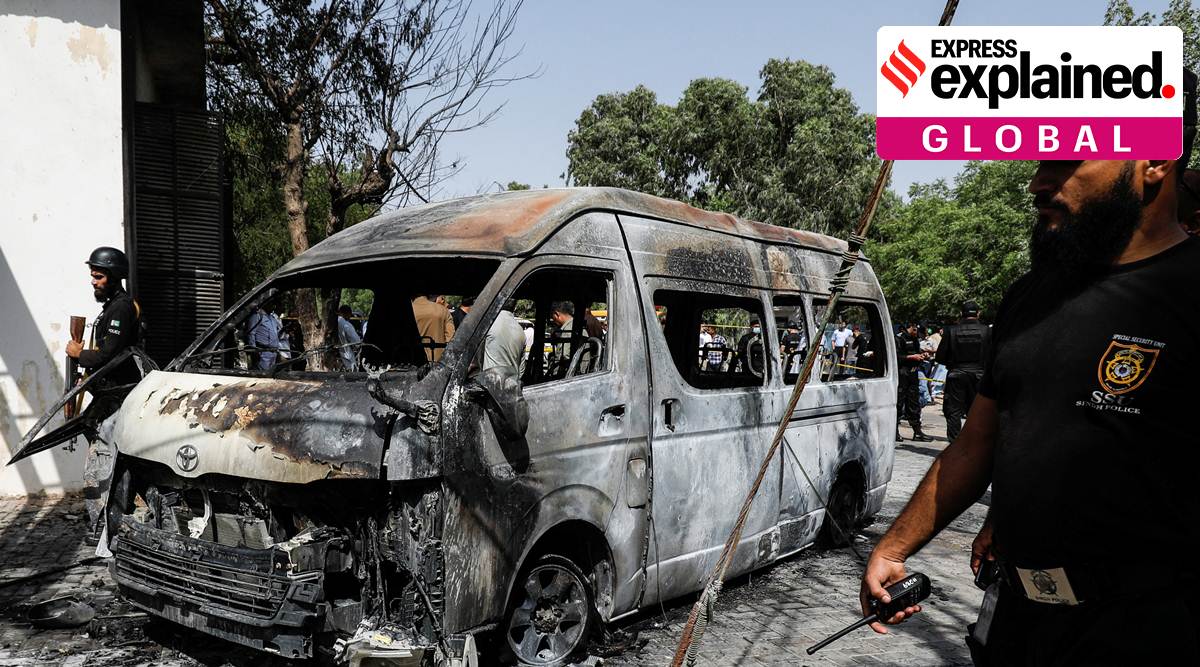Explained: The Baloch group behind Karachi bombing
Karachi bombing: Baloch Liberation Army has claimed responsibility for the suicide attack by a woman. A look at insurgency in Balochistan, and why a Chinese centre was targeted.
 Three Chinese nationals and their Pakisani driver were killed in the attack on Karachi University’s Confucius Institute. (Reuters Photo)
Three Chinese nationals and their Pakisani driver were killed in the attack on Karachi University’s Confucius Institute. (Reuters Photo)On Tuesday, three Chinese nationals and their Pakistani driver were killed in a suicide bombing at Karachi University, outside its Confucius Institute, a Chinese culture and education outreach centre supported by the Chinese Ministry of Education. The Baloch Liberation Army (BLA) claimed responsibility for the attack, also claiming that it was carried out by a female suicide bomber.
The BLA, which announced itself in 2005 with a rocket attack on a paramilitary camp in Balochistan Kohlu during a visit by then President Pervez Musharraf, is a nationalist militant group that has been waging an insurgency for Baloch self-determination and a separate homeland for the Baloch people.
Balochistan borders Afghanistan and Iran. With gas, oil, copper and gold deposits, it is the most resource-rich of Pakistan’s four provinces. It makes up half of Pakistan’s area, but has only 3.6% of its population.
Much before Pakistan bought into Chinese President Xi Jinping’s BRI initiative and the China Pakistan Economic Corridor (CPEC), Musharraf had handed over Gwadar, a fishing village on the Baloch coastline, to the Chinese for development of a deep-water port that would provide China access from the Karokoram Pass to the Arabian Sea.
Baloch nationalism
While the BLA’s armed insurgency is about two decades old, demands of Baloch nationalists for political autonomy and threats of secession date back to 1947 when the Khan of Kalat (who claimed sovereignty over the four princely states of Kalat, Lasbela, Kharan and Makran) held out for independence, and the Pakistan Army forced his accession in March 1948. Between 1973 and 1977, the Zulfikar Ali Bhutto-led government sent in the Pakistan Army to crush a leftist guerilla war inspired by the liberation of Bangladesh.
The tribal sardars of Balochistan, who had been at the forefront of Baloch nationalism, and were co-opted by the state in the late 1970s, grew rebellious again in the early years of this century as Musharraf bypassed them in his vision of Balochistan as strategic territory that would bring China and Pakistan closer. The insurgency gathered momentum from 2006, after the Pakistan Army killed the Bugti sardar, Nawab Akbar Khan Bugti, who had been also been a chief minister and governor of the province. His grandson Brahumdagh Bugti is said to be based in Afghanistan.
Another tribal sardar, Khair Baksh Marri, who was among the early rebels against the Pakistan state, is considered the founder of the BLA, and after he died of old age in 2014, the leadership is alleged by Pakistan to have passed to his son Hyrbairr. He lives in self-exile in London where he campaigns for an independent Balochistan, but denies links to the BLA.
Karachi Suicide Bomber CCTV FOOTAGE …#KarachiBlast #امپورٹڈ_حکومت_نامنظور pic.twitter.com/ItoSMWffHV
— haw di raaj… (@GriffinsPubg) April 26, 2022
The Pakistan Army’s operations against Baloch militancy over the last two decades have seen hundreds of disappearances, and other alleged human rights violations. Baloch nationalists also see the sudden influx of jihadist groups such as Lashkar-e-Jhangvi and Lashkar-e-Toiba in the province as a move by the Pakistan security establishment to counter their nationalist demands.
According to journalist Malik Siraj Akbar in Huffpost, this phase of the Baloch armed struggle posed challenges to the Pakistani state because it “reached the breadth and width of Balochistan… (the) movement involved Baloch women and children who supported the armed groups through regular protest rallies… In 2012, the US Congress convened a hearing on Balochistan and supported the demand for a free Baloch land”.
Pakistan has long alleged that the insurgency is backed by India. It alleges that India had training camps for Baloch rebels in Afghanistan. As Pakistan put pressure on Afghanistan to crack down on Baloch militants on its territory, there were reports in 2017 that Brahumdagh Bugti had applied for Indian citizenship. New Delhi did not confirm or deny the reports. Other reports said he had applied for asylum in Switzerland. The 2019 US designation of the BLA, at a time when the Trump administration wanted Pakistan’s help for talks with the Taliban, put further pressure on the Baloch insurgency.
China target in 2nd wind
After a lull in the middle of the last decade, the BLA made a sudden return in 2017, with a drive-by shooting of 10 workers building a Chinese road project that was part of the CPEC. From then on, BLA has claimed several attacks on Chinese targets in Balochistan and outside.
A November 2018 attack on the Chinese consulate in Karachi, in which four Pakistanis were killed, was claimed by the BLA. In May 2019, another attack claimed by the BLA targeted a five-star hotel in Gwadar, where Chinese delegations stayed. In July 2020, BLA gunmen attacked the Pakistan Stock Exchange in Karachi – the bourse had sold 40% stake to a Chinese consortium in 2016.
Suicide bombers & BLA
It is rare that the BLA has deployed suicide bombers. Two previous instances have been an attack in Dalbandin on a bus carrying Chinese engineers, and an attack on the home of the Baloch politician Naseer Mengal, which he survived but in which 13 others were killed. Tuesday marked the first time the group had deployed a woman on a suicide attack.
Shari Baloch, who carried out the attack, was a mother of two. Her husband is a dentist and her father a government employee. She had degrees in Zoology and Philosophy. Although her motivations are not clear, the BLA claimed in a statement that she had voluntarily signed up to the “self-sacrificing” mission after enlisting in the Majeed Brigade, a sub-group of the BLA, two years ago.
Newsletter | Click to get the day’s best explainers in your inbox
The Majeed Brigade is named after Abdul Majeed Baloch, who is said to have tried to make an attempt on the life of Zulfikar Ali Bhutto at a public meeting in Quetta in 1974 and was shot down on the spot.
This is also the first time that a non-jihadist ethno-nationalist group has deployed a woman suicide bomber in the manner of Sri Lanka’s LTTE. According to security experts familiar with the Baloch insurgency, it marks a worsening security situation, and points to a growing anger in the Baloch population against the Chinese presence. As the training camps are alleged by Pakistan to be in Afghanistan, the incident may also be a pointer to Pakistan’s loss of control in Taliban-ruled Afghanistan.
- 01
- 02
- 03
- 04
- 05






































